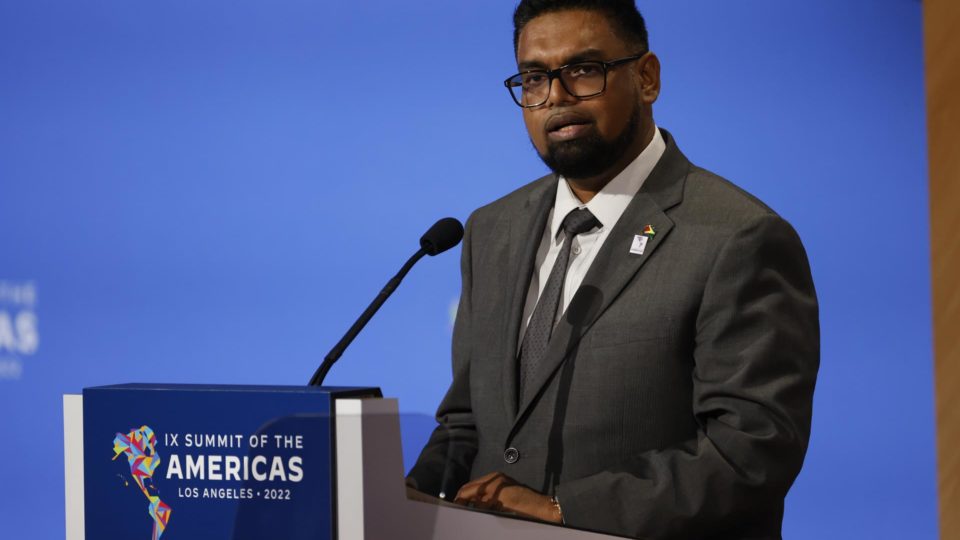The regime of Nicolás Maduro suffered a setback last week in a historic dispute in which Venezuela claims sovereignty over about 70% of the territory of neighboring Guyana.
Last Thursday, the International Court of Justice (ICJ), based in The Hague, Netherlands, declared that it has jurisdiction to rule on the dispute between the two countries over more than 160,000 square kilometers of territory west of the Essequibo River, which runs through Guyana.
The ICJ rejected, by a 14-to-one vote, the arguments of Venezuela, which had set out several written and oral reasons to ask the court to declare Guyana’s claims “inadmissible.”

Guyana had asked the court to “reject the preliminary objections” of Caracas and move on to the case’s merits.
With last week’s ruling, the court will now proceed to hearings on the merits of the dispute, which Georgetown celebrated.
“Guyana is confident that the court will confirm its former international border with Venezuela,” Guyana’s President Irfaan Ali said in a statement.
“Guyana has always been fully committed to the peaceful resolution of the dispute with its neighboring and sister republic per international law.”
The argument regarding sovereignty over the region began in the 19th century.
Caracas argues that the area is part of its territory because, during the colonial period, it was part of the general captaincy of Venezuela.
After Spanish rule, the region was administered by the Dutch starting in 1648 (well before Venezuela declared independence from Spain, which occurred in 1811) and by the United Kingdom starting in 1814.
In 1899, an arbitration award in a Paris court conferred sovereignty over the region to the British Empire.
In 1962, Venezuela filed a lawsuit in the United Nations to challenge the 1899 ruling.
In 1966, the year Guyana obtained its independence from the United Kingdom, the Geneva Accord was signed, which determined the control of the area by the Guyanese, but admitted a Venezuelan challenge.
The dispute was supposed to be resolved in four years, but this did not happen.
Negotiations did not advance in the following decades, and the dispute was even shelved during the government of Hugo Chávez (1999-2013). Still, Venezuela filed the claim again after the American company ExxonMobil discovered large oil reserves in the Guyanese territorial sea in 2015.
In an interview with the BBC in 2017, Guyana’s then Foreign Minister Carl Greenidge said Venezuela’s claim over the Essequibo region “is absurd.”
“No one who speaks Spanish has ever exercised sovereignty over that territory.”
“In fact, in Guyana, you can even find places with French names, the result of French pirate raids, but there are no places with Spanish names, either on the coast of Guyana or in Essequibo,” he said.
Last year, Greenidge, who serves as Guyana’s agent on the issue, lamented the “long dispute.”
“It has cast a long and looming shadow over Guyana’s security and development as a sovereign state, a shadow rooted in Venezuela’s efforts to erase the long land border between our countries and claim nearly three-quarters of Guyana’s land territory,” Greenidge criticized.
CHAVISTA VERSION
Last week, Nicolás Maduro said that Venezuela would continue to claim sovereignty over the region.
“Venezuelans and Venezuelan men and women will continue the tireless and firm struggle to defend respect for the historic Geneva Agreement and the territoriality of our worthy nation. The truth accompanies us,” the Venezuelan dictator wrote on Twitter.
“Essequibo is Venezuela!” he added.
Venezuelan Defense Minister Vladimir Padrino also spoke out on the matter and claimed that the Armed Forces reaffirm their “commitment to guaranteeing the territorial integrity” of the country – which would include the Guayana Esequiba, as Caracas calls the disputed territory.
“We have historical, legal reasons and all the will of the Venezuelan State to continue defending our legitimate claim over Guayana Esequiba,” the minister said on Twitter.
On Monday (10), the number 2 of the Chavista regime, Diosdado Cabello, announced that a “public consultation” is being prepared for Venezuelans to decide “what should be the position” of the country on the dispute with Guyana.
In addition, the Ministry of Education has started an “educational campaign” about the Essequibo region, which includes the distribution in schools of 130,000 maps in which the area is shown as Venezuelan territory.
With information from EFE

